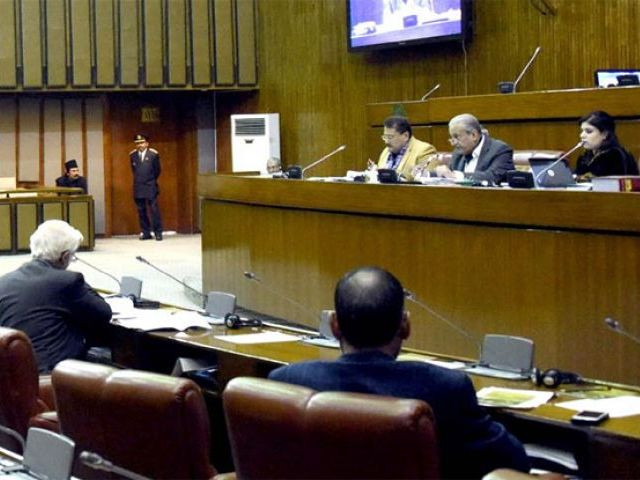Senate panel drafts 8 bills on swift justice
One of the proposed laws deals with witness protection

Chairman Senate, Mian Raza Rabbani presiding over a meeting of the committee of the whole at Parliament House. PHOTO: INP/FILE
Taking the initiative on providing speedy and inexpensive justice to people, the upper house of parliament has drafted eight new bills, including one on security and benefits for prosecution witnesses.
The recommendations, in the form of new legislations, have been proposed by the Senate Committee of the Whole after a detailed examination of the civil and criminal justice systems. The panel was formed in May 2015 on a resolution moved by Senator Col (retd) Tahir Mashhadi of the Muttahida Qaumi Movement.
Inexpensive justice: Senate finalises draft report
The new bills, drafted as a way forward for providing swift justice to the people, will be introduced by all parliamentary party leaders in the Senate as private member bills.
One of the bills, the Witness Protection, Security and Benefit Act, 2015, relates to the investigation and trial of serious offences and envisages providing compensation to the legal heirs of a witness under the protection programme.
The offences with respect to which a witness or a related person may be placed under protection include treason, sedition, murder, rape, violence, robbery, kidnapping, defeating the ends of justice and perjury. Section 4 of the bill states that the government should establish witness protection programmes for the safety of any related persons as soon as the act commences.
The programme includes making necessary arrangements to allow the witness to establish a new identity; to allow the witness to conceal his or her identity by wearing a mask; changing his or her voice, appearance or any other form of segregation during investigation; to allow video conferencing to protect identity provided that such arrangements are approved by the authority concerned.
Anti-graft report get Senate panel’s nod
The bill also calls for assistance in relocating the witness and providing them alternative accommodation; providing transport and reasonable financial assistance to the witness and for earning livelihood. If the protected person is killed due to his participation in the programme, legal heirs would be provided adequate compensation and dependent minors would get free education.
As envisaged by the proposed bill, the Witness Protection Advisory Board would comprise secretaries of the law and justice and finance ministries and also include the attorney general and the police chief.
According to the proposed bill, before a person is provided protection under this act, he shall first execute a memorandum of understanding with the government, setting forth his responsibilities. Any breach of the agreement shall be a ground for termination of the protection provided.
The bills are likely to be introduced in the upper house of parliament in the next session as announced by Senate Chairman Raza Rabbani at the time the report was tabled in the house.
Once passed by the Senate, the bills would then be sent to the lower house for consideration. If they are approved in the National Assembly, they will become laws with the final approval of the president.
Intra-court appeals: Top judge’s suggestion overlooked
The Senate Committee of the Whole has overlooked the top judge’s suggestion in its report and called for abolition of the system of filing intra-court appeals within high courts.
Senate ex-additional secretary arrested after IHC rejects bail plea
The parliamentary panel, which was formed to deliberate on providing speedy and inexpensive justice, has also proposed harsh penalties for judges who fail to decide cases within the specific timeframe.

While addressing senators on November 3 last year, Chief Justice Anwar Zaheer Jamali had talked against omitting the intra-court appeal remedy. “There would be no other forum to rectify the mistakes and the matter would directly land in the top court and overburden it, while forcing the litigants to come to Islamabad,” he said.
The top judge also held the executive responsible for delays in trials and suggested there should not be any legislation against judges. He also called for serious legislative work for ensuring fundamental rights.
CJP Jamali said the country had an abundance of laws. “We are perhaps even over-legislated in some areas,” he said, but termed their implementation a matter of concern.
However, the Senate committee in its 364-page report tabled in the upper house last week preferred the opinion of legal experts over the sitting chief justice’s suggestions.
For speedy justice: Senate views prospect of part-time judges
The proposed abolition of the intra-court appeal system was an idea of former law ministers S M Zafar and Senator Aitzaz Ahsan. They claimed it would reduce the burden on high court judges and the time needed for a matter to attain finality. Under the judicial system an order by a civil judge attains finality when it is decided by the apex court.
The order of a civil judge can be challenged before an additional district and sessions judge, then a district and sessions judge and then before a single-member high court bench.
The committee, however, considered one aspect of CJP Jamali’s suggestion and recommended an increase in the number of Supreme Court judges from 17 to 27. The number of judges has been the same since 1997. A draft bill proposing to raise the number of SC judges has been attached with the report.
Published in The Express Tribune, January 4th, 2016.



















COMMENTS
Comments are moderated and generally will be posted if they are on-topic and not abusive.
For more information, please see our Comments FAQ